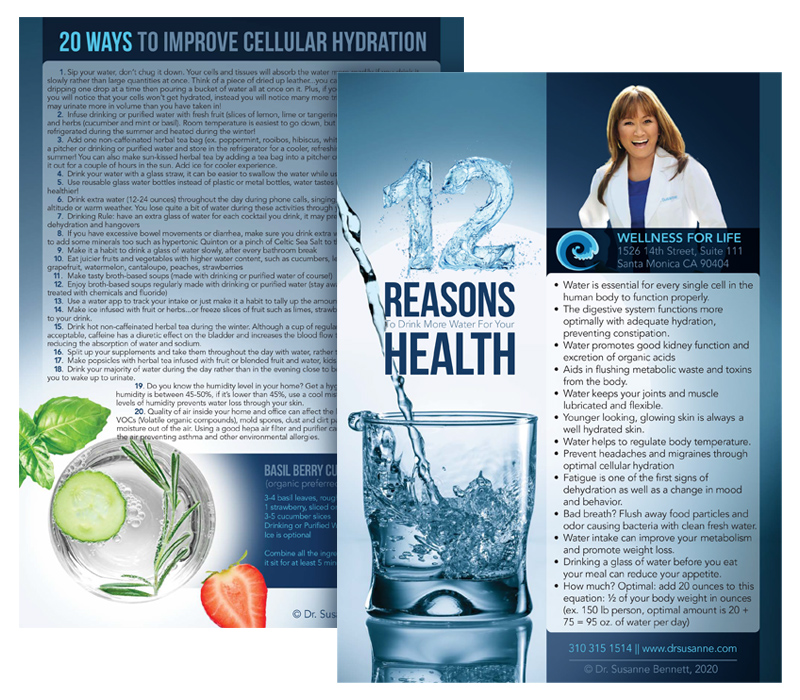As we move into the peak weeks of summer, those outdoor activities continue to beckon. We welcome the warm weather and fresh air of beaches, parks, and walks around the neighborhood. With social distancing still in effect, we’re opting for open air spaces as often as possible.
But more time outside means sun and bugs and expended water. Let’s take a minute to refresh on the skincare tips that help us fend off free radicals, avoid mosquitoes, and maintain the hydration that allows us to function.
Sun Exposure
Although the best way to improve your vitamin D level (optimal: 50-70 ng/mL) is from small doses of daily sun exposure, you still have to be aware that 9,500 people receive a skin cancer diagnosis every day in the US. Yes! That’s EVERY DAY! In the last fifty years, melanoma cases have tripled, and non-cancerous sun damage grows increasingly pronounced as we age.
But before you lather on the sunscreen for protection, read the label and be mindful of its content. For optimum defense, find sunscreens that offer UVB protection — not simply UVA. Avoid products with oxybenzone (most toxic), octocrylene and homosalate. These common sunscreen ingredients have damaging side effects — altering birth weight, interfering with male sperm function, and acting as a potent estrogen and androgen hormone disruptor.
Instead, look for an organic mineral-based formula (not a spray that can irritate eyes, nasal and lung mucosa) containing zinc oxide. Zinc oxide is my favorite way of protecting my sensitive skin without the harmful chemicals found in typical sunscreen formulations. Don’t forget to apply it frequently during your outdoor events, especially after water sports such as surfing and snorkeling, as well as if you’re excessively sweating during your afternoon run or hike.
BTW, did you know there is a big difference between sunscreen and sunblock formulas? Sunscreen chemicals such as oxybenzone and octocrylene absorbs the UVA and UVB rays and scatters it before the rays can penetrate and damage the skin, whereas sunblock agents such as zinc oxide actually sits on top of the skin as a barrier and protectant, directly blocking the harmful rays by reflecting them.
Stay mindful of the environment as well, and don’t use products with petrolatum or titanium dioxide, which is known to hurt marine life. Hawaii has already passed a law banning products with coral-bleaching oxybenzone and octinoxate. It goes into effect in 2021. Mahalo!
Mosquitoes
You definitely want to keep those blood-suckers at bay. One minute you’re enjoying the peaceful mood of a beautiful sunset, the next you’re maniacally scratching a cluster of fresh bites.
People think of mosquitoes as an unavoidable summertime pest. An annoying presence that simply forces us to make do. But keep in mind, just because they’re commonplace doesn’t make them less dangerous.
Mosquitoes might be a nuisance, but their bites can often be harmful to your health. Mosquitoes can carry deadly pathogens which enter the bloodstream and cause mild to severe symptoms — or even disease. Mosquitoes are vector insects that can spread viral infections such as West Nile, Dengue Fever, Chikungunya disease, Zika infections and more. Mosquitoes can also carry blood parasites causing diseases such as malaria and babesiosis which comes with its own bundle of acute and chronic complications.
A solid repellent seems like an easy solution, but remember, perhaps more than sunscreens, many insect repellents on the market contain extremely detrimental components that are harmful to your skin, lungs and major organ systems.
The chief ingredient in most repellents is N,N-diethyl-meta-toluamide aka DEET — a chemical that won’t stop the mosquitoes from landing on you, but does prevent them from biting you. My concerns with using DEET are the studies indicating how it affects your ability to break down a neurotransmitter called acetylcholine, triggering movement and neurological disorders. Another older study connected DEET to childhood seizures and brain toxicity.
Although many scientists and doctors consider DEET to be relatively safe, just the smell of it makes me think it’s toxic in some way! I am a mosquito magnet, and for years I have tried the all-natural approach of lotions and potions that include herbal ingredients such as citronella, rosemary, lemongrass, clove and more, but nothing…nothing works as well as magnesium oil! Really!
I found this amazing secret by accident 7 or 8 years ago, on one of my many trips down to Mexico. Every vacay I would come back with at least 5 to 7 or more mosquito bites, even after using a mosquito net over my bed. One day, my muscles were really sore after working out hard with push-ups and beach sprints, so I put magnesium oil all over my arms and legs several times a day for the pain and stiffness. And as my muscle soreness dissipated over the three days of application, I noticed I didn’t have any mosquito bites either!
My theory is that mosquitoes have a strong aversion to the taste of magnesium chloride oil because it’s super bitter. So ever since, I have been using magnesium oil as my all-natural alternative to the toxin-filled sprays. It delivers excellent results on top of your daily magnesium dose. Try it out and tell me if it works for you too!
There is one other natural solution if the magnesium oil isn’t an option for you…and that is cedar oil. That’s right, it comes from the cedar tree and actually kills and repels all types of insects including mosquitoes, fleas, ticks, flies, ants, mites, chiggers, noseeums, cockroaches and more. It’s for people, pets and can also be sprayed indoors. BTW, cedar oil will not harm the bee population, which is good…we need more bees on our planet! I get the cedar oil spray from cedarcide.com, and I have also used the lawn spray to get rid of ticks and fleas in the yard to protect my little pup Lola!
One more thing: be practical about your attire. If you know you’re going into intense bug infested terrain, look into broad-brimmed hats with mosquito netting, and wear long-sleeved thin cotton shirts and pants that provide you a stronger defense, although some mosquitoes have been known to bite you through your clothing!
Hydration
We all sweat or glisten, depending on the verbiage you prefer. But sometimes our hydration levels can sink imperceptibly throughout the day as we fail to keep up with our water needs. You don’t have to be outside running marathons in the heat. You can dehydrate in the coolness of your air conditioned office simply from long periods of talking and interaction.
Your body’s water should be continually replenished and replaced — and more often during the warmer months. Drinking half your bodyweight (pounds) in ounces of water is a good rule of thumb for your minimum daily intake. Make sure you’re opting for drinking purified water rather than tap water that’s been chemically treated and contaminated with chlorine, fluoride, chloramines, lead, arsenic, MTBE (methyl-t-butyl ether) and more.
Be cautious of mineral water or spring water — both of which may contain minute levels of toxic metals (arsenic and nickel) or other “natural” metals such as thallium, titanium and silver that you might not want mixed into your system. Definitely ask the water company for the 3rd party water analysis test. Fresh water bodies across the US have tested positive for mercury, so that spring water you think is so untouched actually may harbor its own share of trace contaminants.
On that note, if you are interested in digging deeper into the health benefits of water, hold on tight…my next blog will be all about my favorite natural healing element: water!
In the meantime, take advantage of every outdoor opportunity while you can! This time of year can be extremely soul-nourishing — a small reprieve from the stressors of the pandemic. With a few slight adjustments to your purchases and routines, you can count on a summer of good health, great skin, and a thriving lifestyle.


